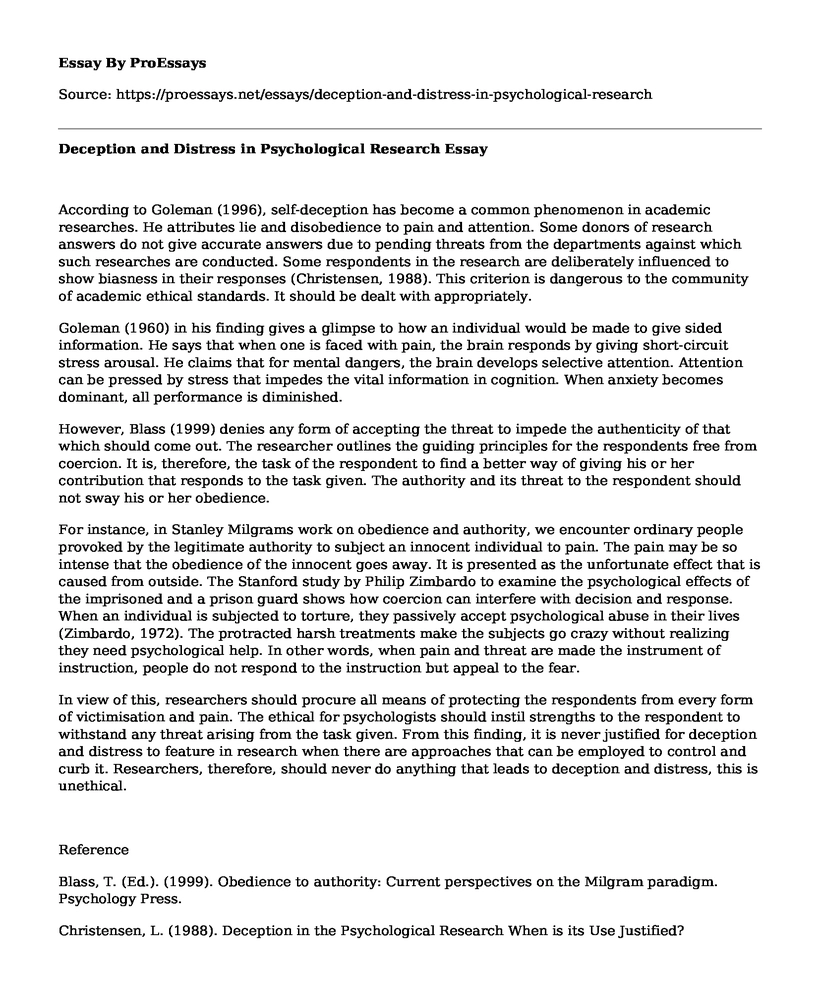According to Goleman (1996), self-deception has become a common phenomenon in academic researches. He attributes lie and disobedience to pain and attention. Some donors of research answers do not give accurate answers due to pending threats from the departments against which such researches are conducted. Some respondents in the research are deliberately influenced to show biasness in their responses (Christensen, 1988). This criterion is dangerous to the community of academic ethical standards. It should be dealt with appropriately.
Goleman (1960) in his finding gives a glimpse to how an individual would be made to give sided information. He says that when one is faced with pain, the brain responds by giving short-circuit stress arousal. He claims that for mental dangers, the brain develops selective attention. Attention can be pressed by stress that impedes the vital information in cognition. When anxiety becomes dominant, all performance is diminished.
However, Blass (1999) denies any form of accepting the threat to impede the authenticity of that which should come out. The researcher outlines the guiding principles for the respondents free from coercion. It is, therefore, the task of the respondent to find a better way of giving his or her contribution that responds to the task given. The authority and its threat to the respondent should not sway his or her obedience.
For instance, in Stanley Milgrams work on obedience and authority, we encounter ordinary people provoked by the legitimate authority to subject an innocent individual to pain. The pain may be so intense that the obedience of the innocent goes away. It is presented as the unfortunate effect that is caused from outside. The Stanford study by Philip Zimbardo to examine the psychological effects of the imprisoned and a prison guard shows how coercion can interfere with decision and response. When an individual is subjected to torture, they passively accept psychological abuse in their lives (Zimbardo, 1972). The protracted harsh treatments make the subjects go crazy without realizing they need psychological help. In other words, when pain and threat are made the instrument of instruction, people do not respond to the instruction but appeal to the fear.
In view of this, researchers should procure all means of protecting the respondents from every form of victimisation and pain. The ethical for psychologists should instil strengths to the respondent to withstand any threat arising from the task given. From this finding, it is never justified for deception and distress to feature in research when there are approaches that can be employed to control and curb it. Researchers, therefore, should never do anything that leads to deception and distress, this is unethical.
Reference
Blass, T. (Ed.). (1999). Obedience to authority: Current perspectives on the Milgram paradigm. Psychology Press.
Christensen, L. (1988). Deception in the Psychological Research When is its Use Justified? Personality and Social Psychology Bulletin, 14(4), 664-675.
Goleman, D. (1996). Vital lies, the simple truths: A psychology of self-deception. Simon and Schuster.
Zimbardo, P. G. (1972). Comment: Pathology of imprisonment. Society, 9(6), 4-8.
Cite this page
Deception and Distress in Psychological Research. (2021, Mar 02). Retrieved from https://proessays.net/essays/deception-and-distress-in-psychological-research
If you are the original author of this essay and no longer wish to have it published on the ProEssays website, please click below to request its removal:
- Essay Sample on the Play Therapy
- Counseling Career Exploration Paper Example
- Essay on Media Multitasking & Adolescent Executive Function
- Paper Example on Qualitative Research: Exploring Different Approaches
- Diagnosing Autism Spectrum Disorder: Clinical Lengths - Essay Sample
- Essay Sample on Neuroimaging and Autism Spectrum Disorder: Impact of Subcortical Structures
- Exploring the Role of Behavioral Finance in Investment Decisions - Free Paper Example







